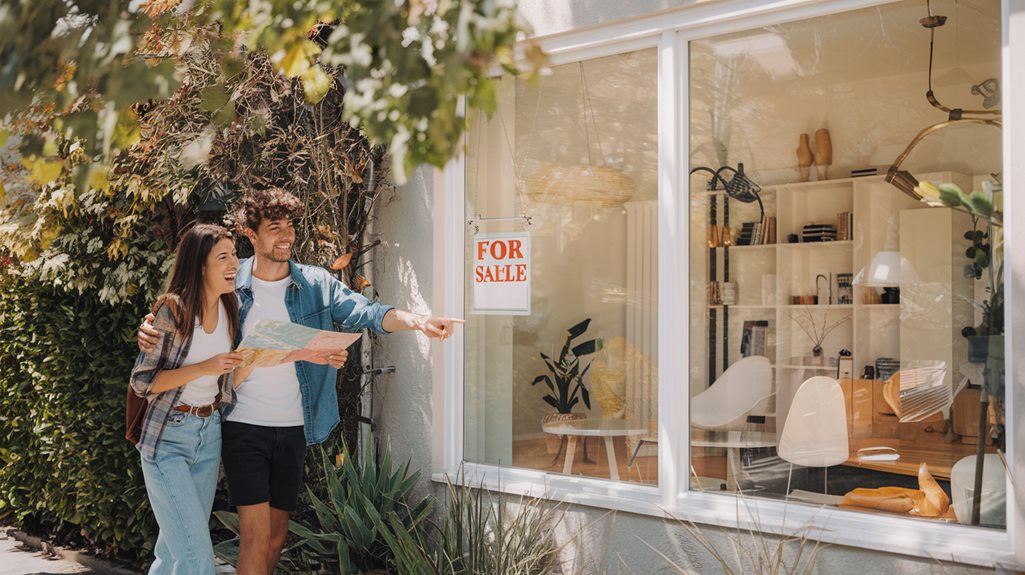Buying your first home is a big adventure! To make it a happy one, you need some good tips. First, check your money situation and set a budget. This helps you not to spend too much.
Then, get a mortgage pre-approval. This can help you when you talk about prices.
Next, look at different neighborhoods to find the best spot for you. It's also smart to work with a good real estate agent. They can help you a lot!
When you find a home you like, check it carefully to make sure it's in good shape. Also, know about closing costs so there are no surprises.
Think about what you might need in the future and keep up with home maintenance to protect your new home.
There is so much more to learn that can help you buy a home you love!
Ready to start building equity in your own Michigan home? Get your personalized home loan quote today.
Assess Your Financial Health

Before you start looking for a new home, it's really important to check how you're doing with money.
First, look at your credit score. This number can change how much money you can borrow and how much you'll pay back.
Next, make sure you have some savings saved up. It's smart to have an emergency fund for surprises like a broken car or a leaky roof.
It's also good to keep your debts low. Try to pay off any loans that charge you a lot of interest. This makes it easier to pay for your new home.
Learn about how to budget and save money. This will help you reach your money goals.
Check if your job gives you steady money. You want to be sure you can pay your mortgage each month without stress.
Think about what could go wrong and plan for those things. By doing all this, you'll be ready to buy a home and be part of a group of smart, secure homeowners.
Michigan residents, unlock the door to your new home. Request your home loan quote from Treeside Financial today.
Determine Your Budget
To make a good budget for your first home, look at how much money you have now.
Think about your earnings, what you owe, and how much you have saved.
Next, add up what you spend each month. This will help you see how much money you can pay for a mortgage without making things too tight.
After that, check out different loan options to find one that works best for you.
Assess Financial Situation
Buying a home is a big step! The first thing you need to do is look at your money situation. Start by checking your credit score. This score helps banks decide if they'll lend you money for a house. A good score can help you get better loan deals.
Next, think about how you'll save money for your new home. It's a great idea to set up a special savings account just for your down payment. You can make it easier by having some money automatically moved into this account each month.
Make sure you know how much you can save without making big changes to your daily life.
When you understand your money and make a budget, you're ready to buy a house. Remember, you aren't just getting a new place to live; you're becoming part of a community. A good plan will help you have a smooth and happy home-buying experience!
Calculate Monthly Expenses
Figuring out how much money you spend each month is really important when you want to buy a house. Start by writing down all the things you pay for, like your electricity bill, insurance, and property taxes.
You should also have some money saved for emergencies, just in case something breaks. If you want to buy a house that needs fixing, think about how much that will cost, too.
Don't forget about getting to work. If you drive or take the bus, those costs can add up. Look at what fun things are in your neighborhood that might cost money, like a gym or community events.
If your new home has a nice garden, you might need to pay for landscaping, too. A home warranty can help keep you safe from big repair costs, but it will cost you each month.
And remember to think about how much it will cost to move into your new home. If you plan for all these things, you'll be ready to find your perfect home!
Explore Loan Options
Getting a home loan can feel like a big puzzle, but it's important to know your choices so you can plan your money.
First, look at different types of loans like FHA loans, VA loans, and regular mortgages. Each one has its own good points and rules.
FHA loans let you put down less money and have more relaxed rules for lenders. VA loans are for veterans and don't need any down payment. Regular mortgages often have good interest rates but might need a higher credit score.
Think about how long you want to keep your loan and when you want to close on your house.
Don't forget about mortgage insurance, which can change how much money you pay each month. You might also want to think about refinancing later on for more options.
By learning about these loans, you'll feel more like you belong with other smart buyers.
You'll be ready to make good choices in today's market!
Get Pre-Approved for a Mortgage

Getting pre-approved for a mortgage is an important step when you want to buy a home. It can make your search easier and help you when you talk to sellers. When you have pre-approval, it shows sellers that you are serious. This can help you get a better deal.
First, learn about different types of mortgages. This will help you understand how they change your monthly payment. Pay attention to interest rates too, as they affect how much you can afford.
Here are some benefits of getting pre-approved:
| Feelings | Practical Help |
|---|---|
| You feel confident | You know your budget |
| You feel like you belong | You can negotiate better |
| You feel calm | You can close faster |
| You feel powerful | You have less stress |
| You feel excited | You can focus on the right home |
Getting pre-approved makes you feel part of a group of smart buyers. It helps you on your journey to find a home with more confidence.
Research the Market
Before you buy a home, it's important to look at how much houses cost in your area. Prices can change, so check what they're now.
Learn about the neighborhood too. Find out about schools, parks, and the kind of people who live there. This will help you see if it's a good fit for you.
Lastly, compare the homes you like to see which one has what you need and fits your budget.
Analyze Local Pricing Trends
When you want to buy your first home, it's really important to understand the prices in your area. This helps you make smart choices about your money and find a place where you feel at home. By keeping an eye on how prices change, you can find good deals and stay away from mistakes.
Start by looking at old prices and current reports to see how things have changed. This information helps you guess what might happen next and talk to sellers in a smart way.
You can also chat with local real estate agents and go to open houses to learn more. Remember, being informed is your best friend in this journey.
When you understand local prices, you're not just buying a house; you're becoming part of a community with a good sense of what to do next.
Understand Neighborhood Dynamics
When looking for your first home, think about what the neighborhood is like. It's important to feel happy and safe where you live. Look for parks, schools, and ways to get around. These things help you feel like you belong and will make your life better.
Talk to people who live there. They can tell you if the area feels safe and fun. Here are some things to think about:
| Factor | Things to Think About |
|---|---|
| Community Amenities | Parks, schools, transport |
| Neighborhood Safety | Crime rates, street lights |
| Local Culture | Events, community activities |
| Future Development | New buildings and growth plans |
| Proximity to Work | How long it takes to get to work |
Compare Property Features
When looking for a new home, it's important to compare the features of different properties. This helps you find the right fit for your life.
Start by checking out different types of homes and see what works best for you. Think about where the home is located. Is it close to schools? Can you easily get to places you like?
Make a list of what you want in your new home. Do you need it to save energy? Do you want a nice yard?
Also, remember to think about how much it will cost to keep the home in good shape. This can affect your money and how much you can sell it for later.
As you make your choices, imagine how these things will help you feel at home and part of a community.
Choose the Right Location

Choosing the right place to live is super important when you're buying a home. It's not just about the house; it's about the neighborhood too!
Here are some things to think about:
- How long does it take to get to work or school? If it takes a long time, it can make your day harder.
- What are the schools like? If you have kids or plan to, good schools are really important for learning and can help your house value go up.
- What fun things are nearby? Parks and places to play help you relax and meet new friends.
Also, think about how you feel in the neighborhood:
- Is it safe? A safe place lets you feel calm and happy.
- What's the community like? A lively neighborhood can make you feel like you belong.
- Do your values match the area? It's good if the place feels right for you.
Keep an eye on what's happening around you. New buildings or changes can make a big difference.
Take your time and make sure you feel at home from the very start!
Consider Future Needs
Buying a home is an important decision. It's not just about today; you need to think about what you might need in the future.
Will your family grow? Will you change jobs? Ask yourself if the house has enough space for everyone and if it's easy for everyone to get around.
Look for neighborhoods with parks, good schools, and places to shop. These things make life better and can help when you want to sell your home later.
Also, think about energy-efficient homes. They can save you money and are more appealing to buyers.
Work With a Real Estate Agent

Working with a real estate agent who knows your area can really help you find the perfect home.
They can guide you through the tricky parts of negotiating, so you can get a great deal.
When you trust them, you can relax and make smart choices without feeling stressed.
Find Local Market Experts
Buying a house can be tough, but having a smart local real estate agent can really help. These agents know a lot about the area and can share important information. They can tell you about the best neighborhoods and what houses are worth.
They help you see if it's a good time to buy and if the house is a good deal. With their help, you can find a home that feels just right for you.
- Feel safe: You can trust their help to understand the market.
- Know your area: They can explain what makes each neighborhood special.
- Make smart choices: They show you the best options for your future.
Working with a good agent means you'll have the right tools to make smart choices. This will make your journey to find a home happy and successful.
Navigate Negotiation Strategies
Buying your first home can be a big deal! Knowing how to negotiate can help you get a better deal, and a good real estate agent is someone who can really help you. They can guide you on how to make smart offers, set limits to protect yourself, and understand how everyone feels during the process.
To make sure both you and the seller feel good about the deal, it's important to talk clearly and pick the right time to make your move. Your agent will also get to know the seller's side better and look at similar homes to make sure your offer is fair.
Here's a simple guide:
| Strategy | Purpose |
|---|---|
| Offer Concessions | Make the seller happy |
| Establish Boundaries | Keep your needs safe |
| Understand Emotions | Help with feelings |
| Leverage Timing | Make the best deal possible |
| Research Comparables | Show why your offer is good |
With these tips, you can feel ready to negotiate!
Inspect the Property Thoroughly
Before you buy your first home, it's super important to check it out really well!
Looking at a house closely helps you understand how good or bad it is. This way, you won't find any surprises later that make you unhappy. Make sure to hire a good inspector who knows how to check the walls, wires, and pipes.
Try to be there when the inspector looks at the house. You can ask questions, and this will help you feel smart about your choice. Checking the house helps you keep your money safe and makes sure you pick a nice place to live.
- Feel Safe: You'll know your new home is a good place.
- Save Money: Find problems early so you don't spend too much later.
- Be Part of the Community: Make sure your dream home is a nice fit for the neighborhood.
Understand Closing Costs

Understanding closing costs can be tough, but it's super important before you buy your first home. These costs are the last things you need to take care of before you get your new place.
Let's look at what these costs are. You might've to pay for things like appraisal fees, title insurance, and escrow charges. These prices can change, so it's good to ask for an estimate early on.
Talk to your real estate agent or lender to get a good idea of what to expect. They can help you know what you need to pay, making you feel more relaxed about the whole thing.
Think of this as a chance to learn more about money, so you can move into your new home and community with confidence!
Plan for Home Maintenance
Owning a home is more than just buying a house. It's about taking care of it so it stays nice and keeps its value.
You should set aside some money for things like checking your home, fixing things each season, and handling emergencies. You can try fixing small problems yourself, but for bigger ones, it's okay to get help or use a home warranty.
Taking care of your appliances and yard helps make your home a happy place.
- Feel Safe: A home that's cared for means fewer surprises.
- Be Proud: You'll enjoy showing off your nice home.
- Make Friends: You can share tips with neighbors who care for their homes too.







